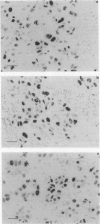Abstract
Constant denaturant gel electrophoresis (CDGE) was used to screen 179 breast carcinomas for mutations in the conserved regions of the TP53 gene (exons 5 through 8). Mutations were found in 35 of 163 primary tumours (21%) and in 5 of 16 metastases (31%) and resided predominantly in exon 7. The majority of the mutations were G:C-->A:T transitions. Immunohistochemistry demonstrated nuclear accumulation of p53 protein in 35 of 162 primary tumours (22%) and in four of 15 metastases (27%). TP53 mutation was strongly associated with nuclear accumulation of p53 protein. In total 42 of 163 primary tumours (26%) and 5 of 16 metastases (31%) were demonstrated to contain TP53 alterations (mutation and/or nuclear protein accumulation). TP53 alteration in primary tumour was significantly associated with the following parameters: positive node status, T status > 1, negative oestrogen receptor status, negative progesterone receptor status, presence of ERBB2 gene amplification, and invasive ductal histology. Furthermore, there were statistically significant associations, independent of other prognostic factors, between TP53 alterations in primary tumour and disease-free and overall survival.
Full text
PDF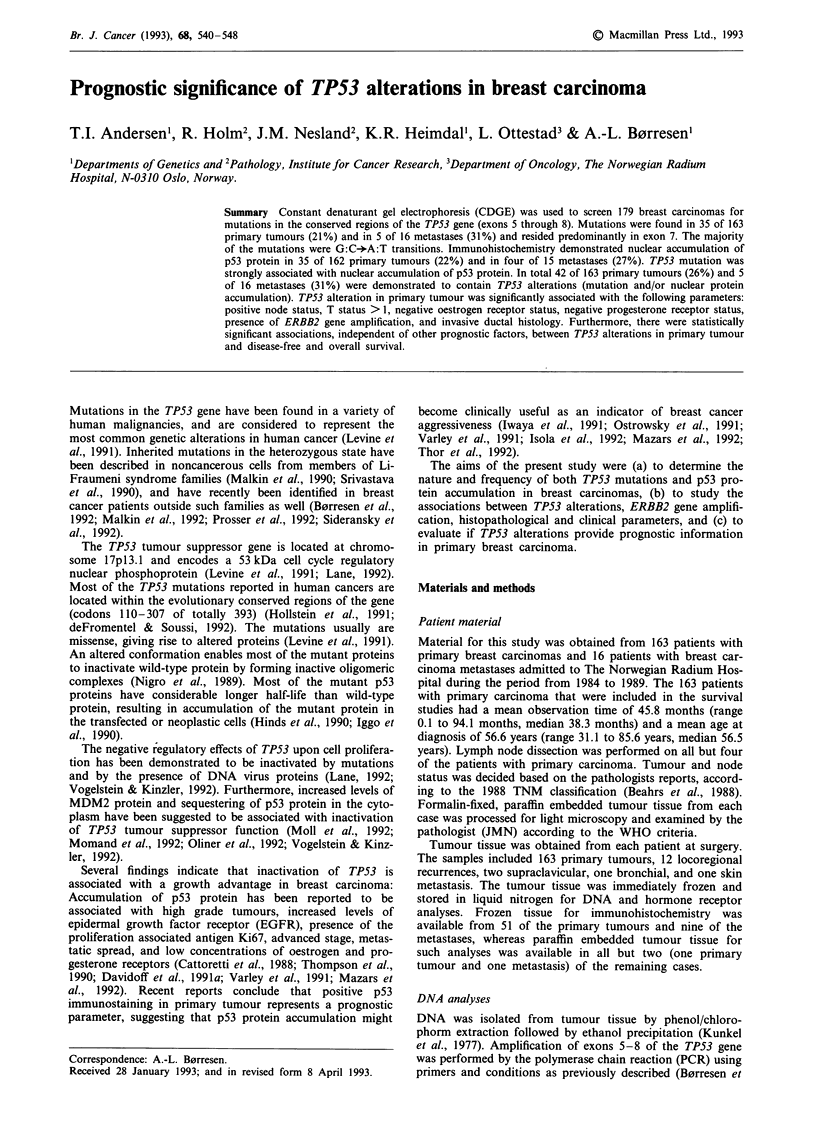
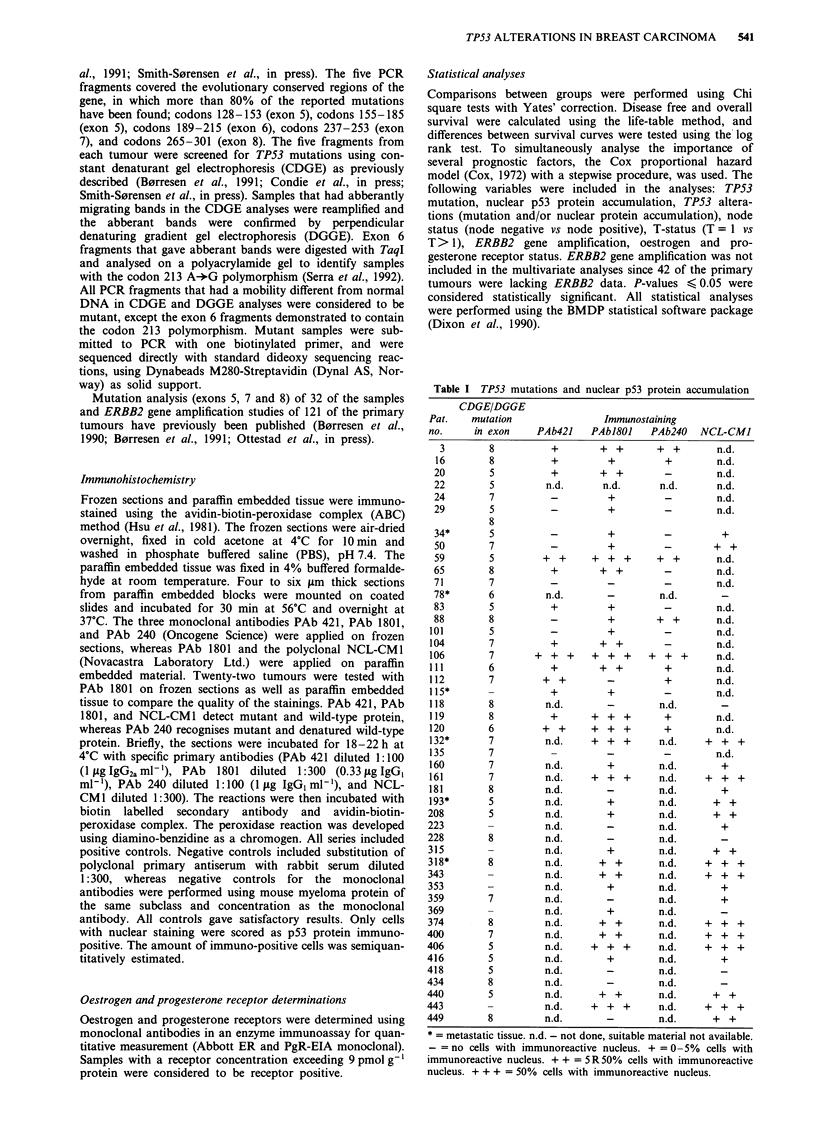
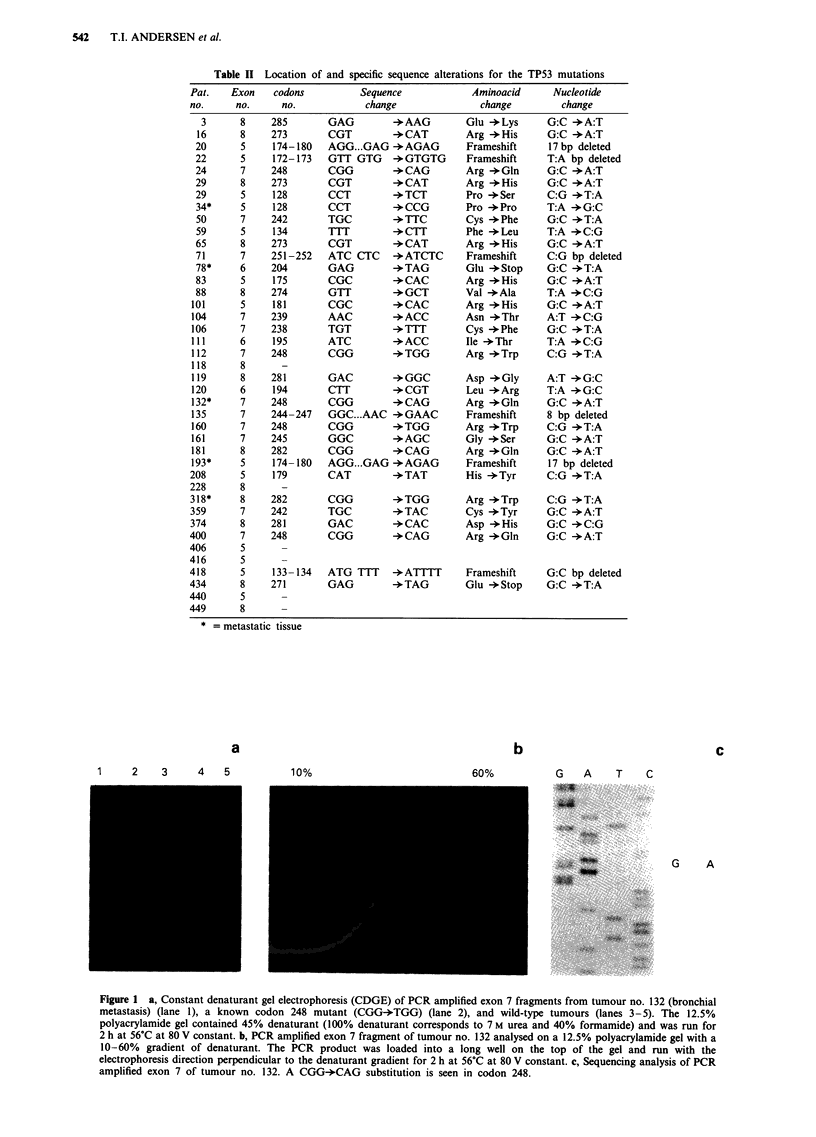
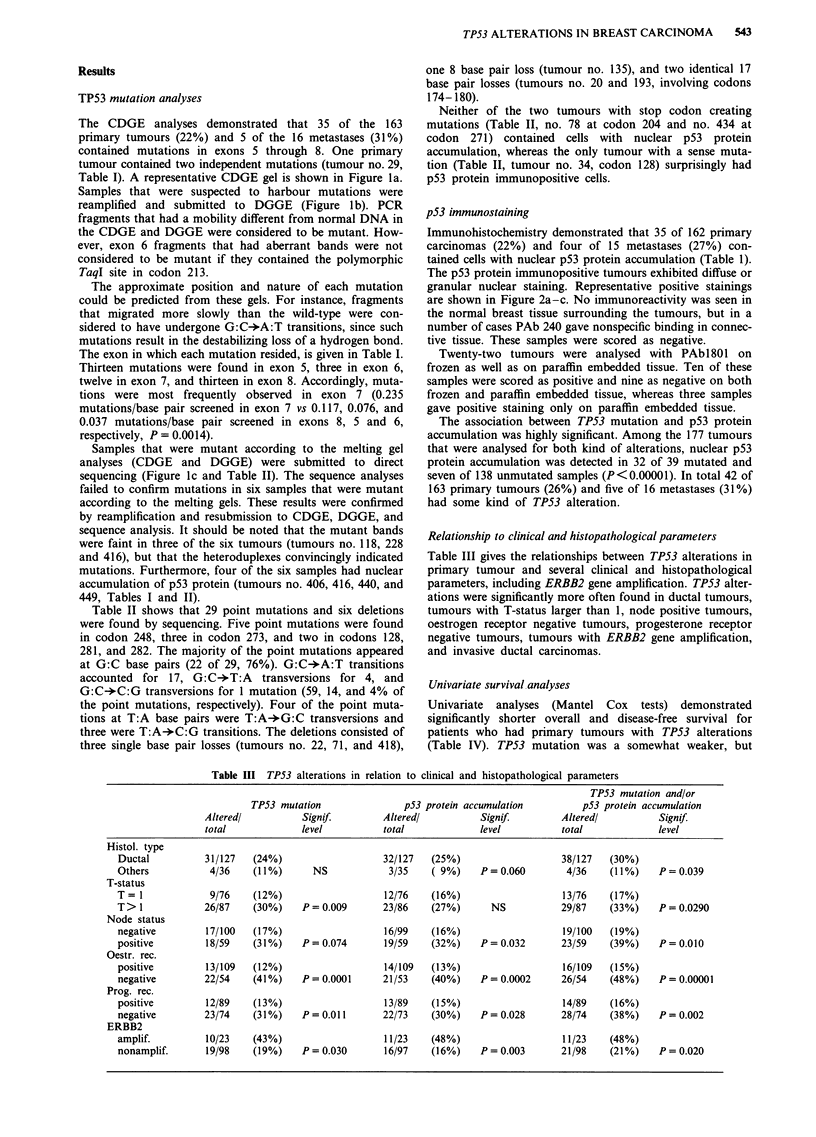
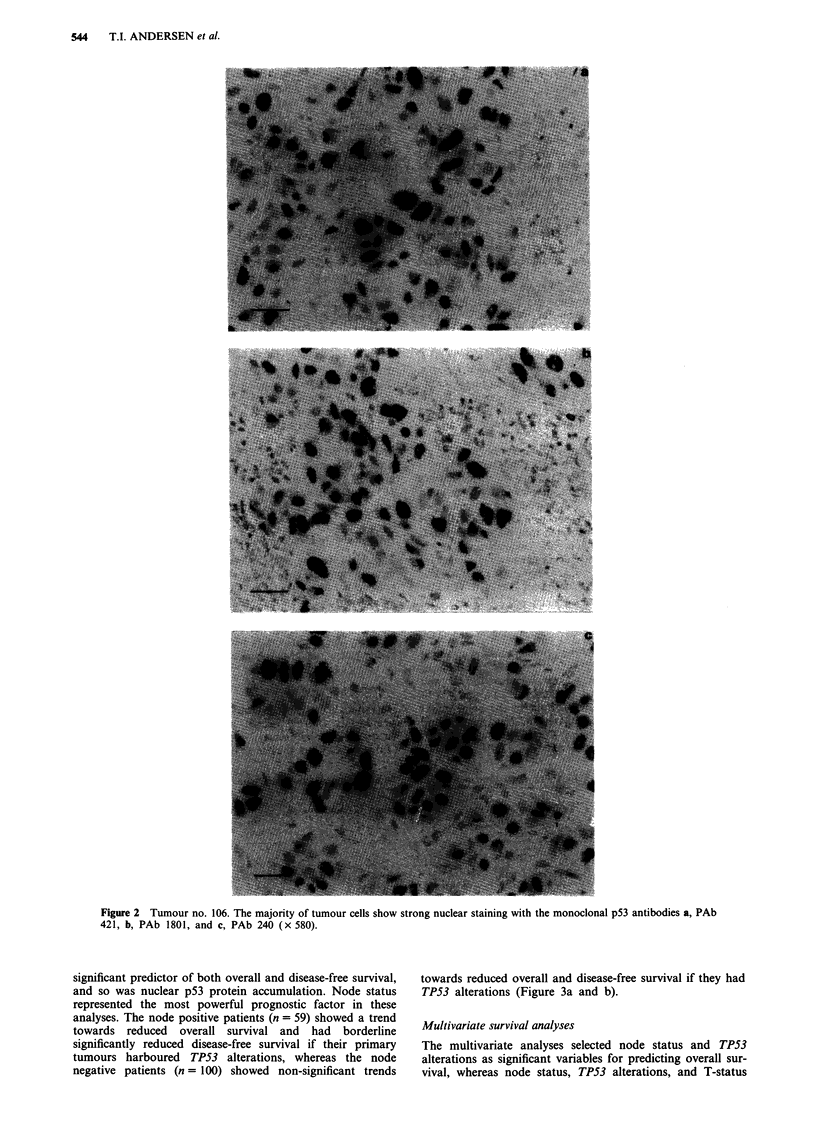
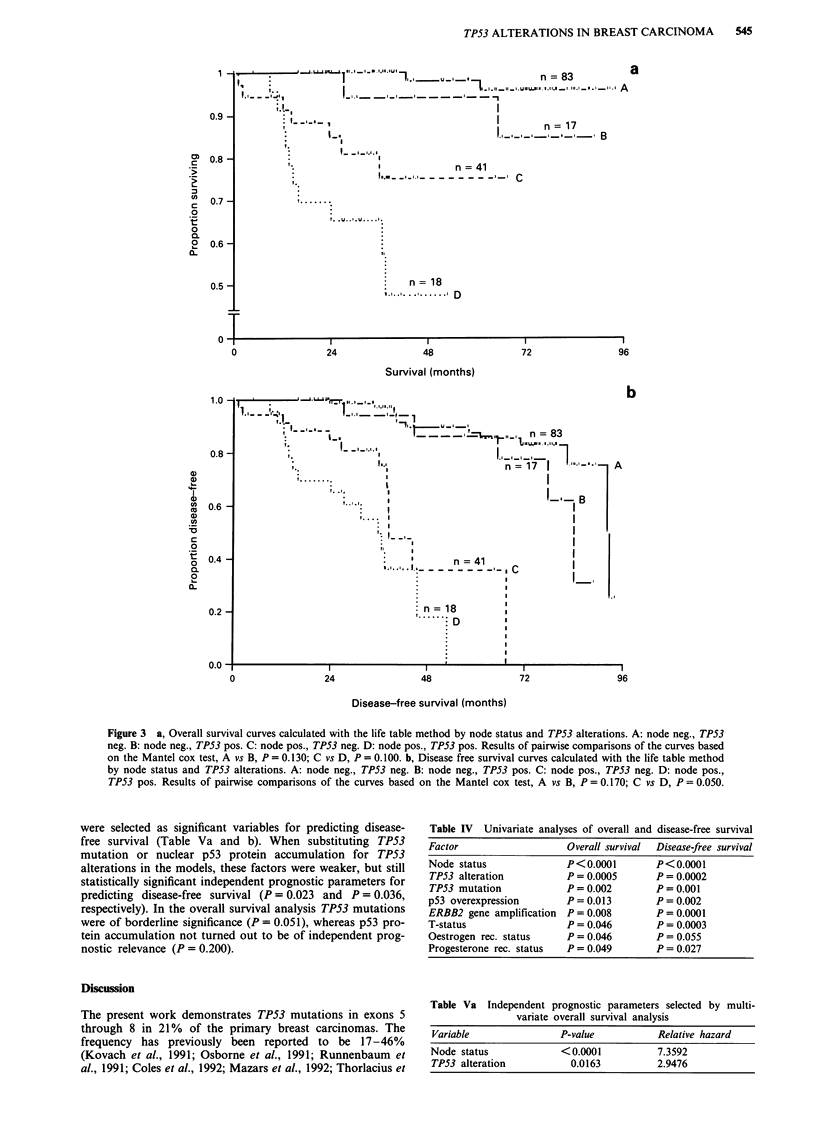
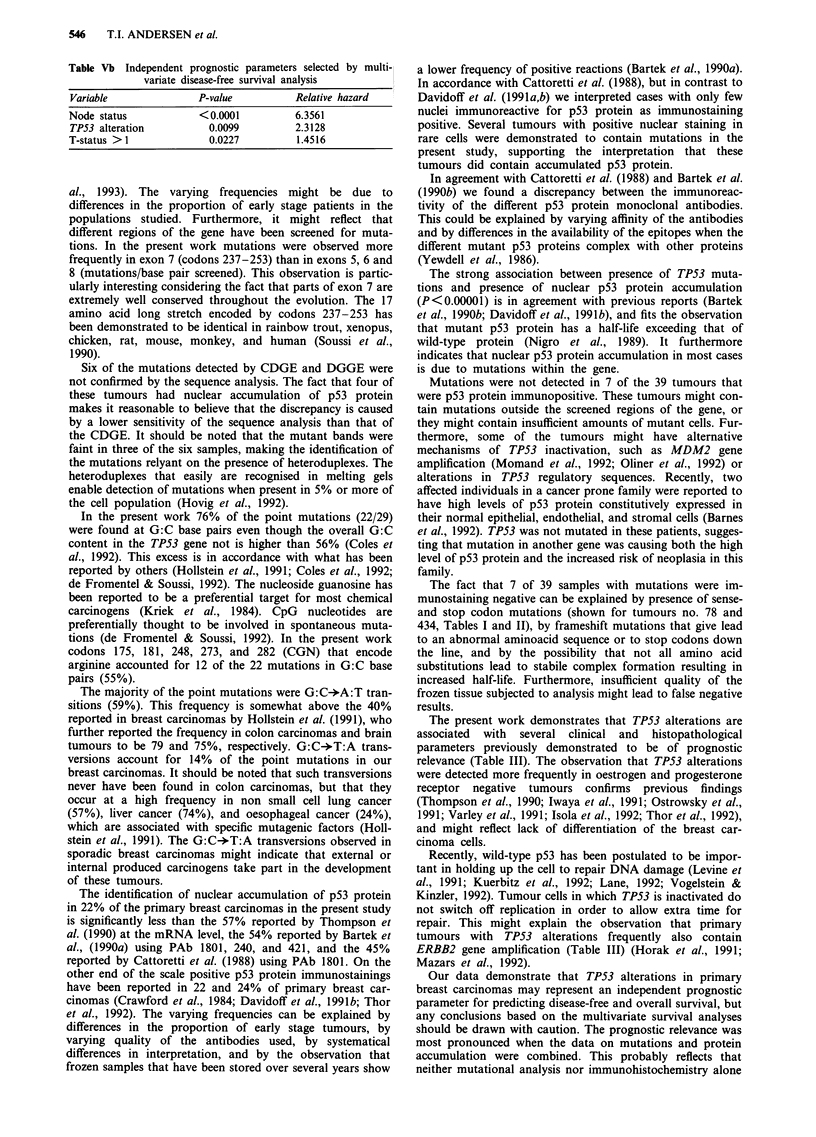
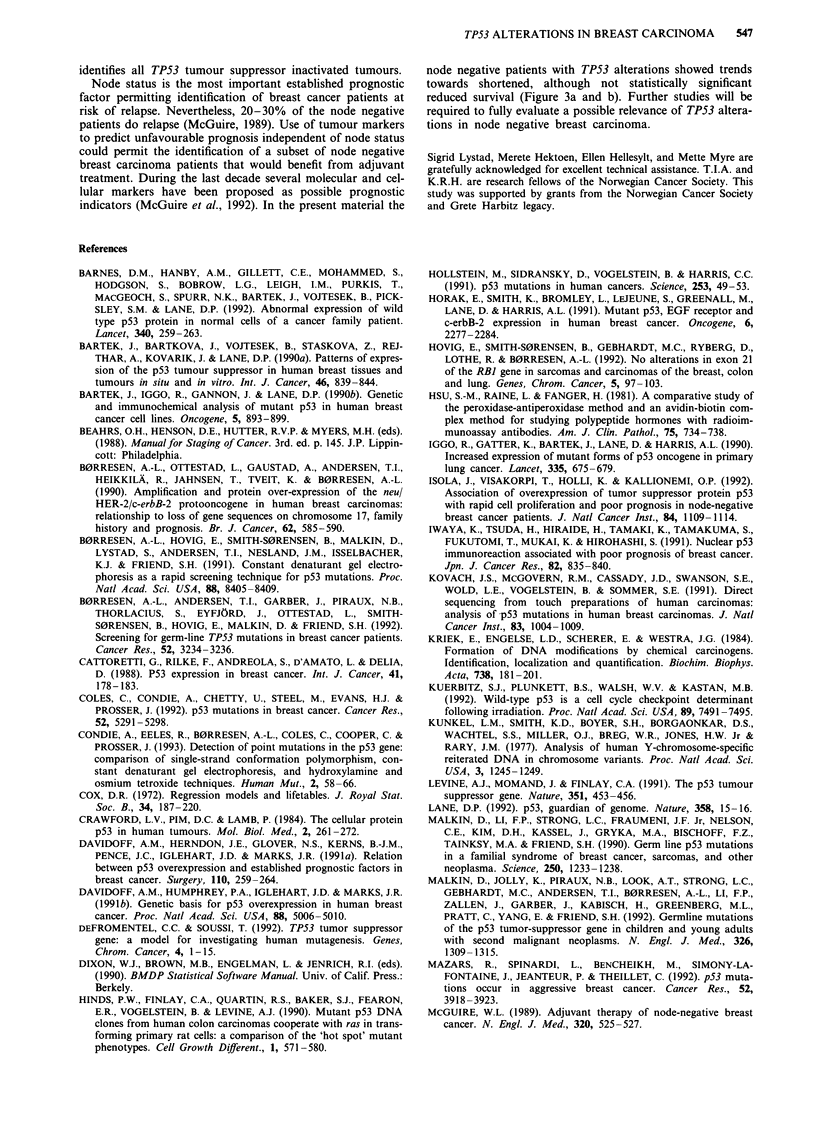
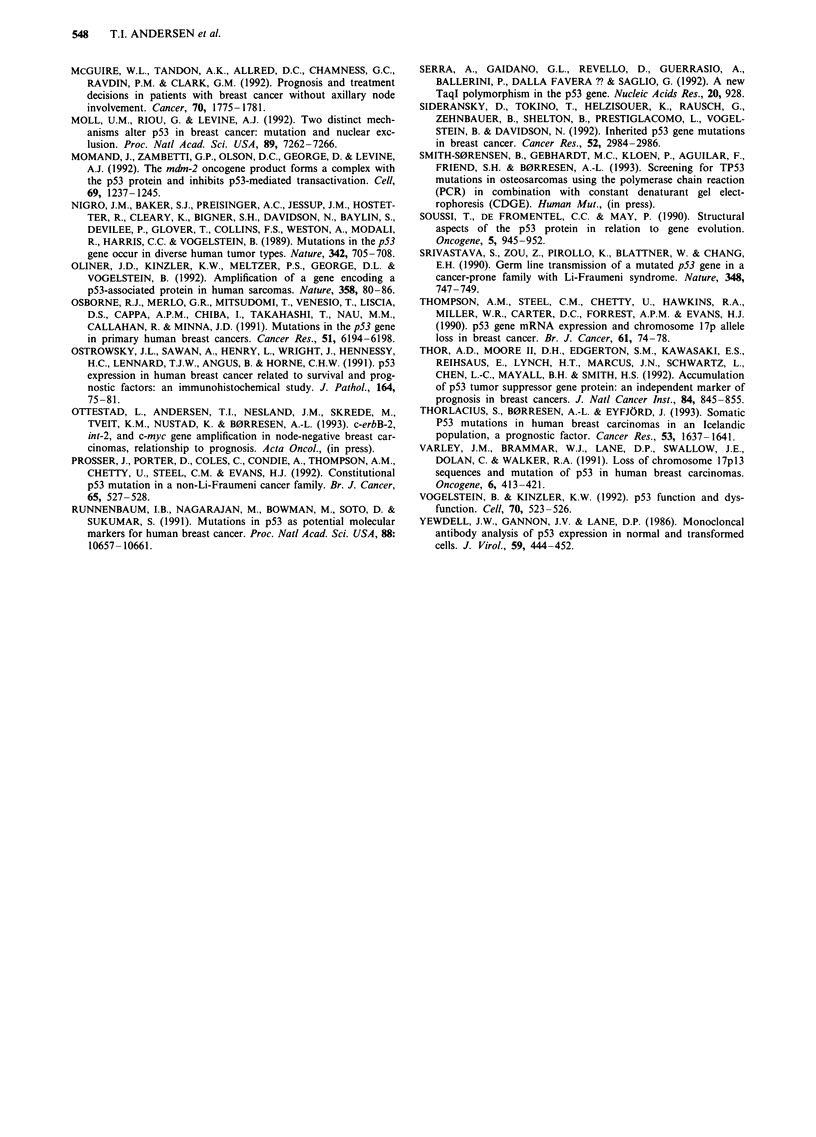
Images in this article
Selected References
These references are in PubMed. This may not be the complete list of references from this article.
- Barnes D. M., Hanby A. M., Gillett C. E., Mohammed S., Hodgson S., Bobrow L. G., Leigh I. M., Purkis T., MacGeoch C., Spurr N. K. Abnormal expression of wild type p53 protein in normal cells of a cancer family patient. Lancet. 1992 Aug 1;340(8814):259–263. doi: 10.1016/0140-6736(92)92354-i. [DOI] [PubMed] [Google Scholar]
- Bartek J., Iggo R., Gannon J., Lane D. P. Genetic and immunochemical analysis of mutant p53 in human breast cancer cell lines. Oncogene. 1990 Jun;5(6):893–899. [PubMed] [Google Scholar]
- Bártek J., Bártková J., Vojtesek B., Stasková Z., Rejthar A., Kovarík J., Lane D. P. Patterns of expression of the p53 tumour suppressor in human breast tissues and tumours in situ and in vitro. Int J Cancer. 1990 Nov 15;46(5):839–844. doi: 10.1002/ijc.2910460515. [DOI] [PubMed] [Google Scholar]
- Børresen A. L., Andersen T. I., Garber J., Barbier-Piraux N., Thorlacius S., Eyfjörd J., Ottestad L., Smith-Sørensen B., Hovig E., Malkin D. Screening for germ line TP53 mutations in breast cancer patients. Cancer Res. 1992 Jun 1;52(11):3234–3236. [PubMed] [Google Scholar]
- Børresen A. L., Hovig E., Smith-Sørensen B., Malkin D., Lystad S., Andersen T. I., Nesland J. M., Isselbacher K. J., Friend S. H. Constant denaturant gel electrophoresis as a rapid screening technique for p53 mutations. Proc Natl Acad Sci U S A. 1991 Oct 1;88(19):8405–8409. doi: 10.1073/pnas.88.19.8405. [DOI] [PMC free article] [PubMed] [Google Scholar]
- Børresen A. L., Ottestad L., Gaustad A., Andersen T. I., Heikkilä R., Jahnsen T., Tveit K. M., Nesland J. M. Amplification and protein over-expression of the neu/HER-2/c-erbB-2 protooncogene in human breast carcinomas: relationship to loss of gene sequences on chromosome 17, family history and prognosis. Br J Cancer. 1990 Oct;62(4):585–590. doi: 10.1038/bjc.1990.334. [DOI] [PMC free article] [PubMed] [Google Scholar]
- Caron de Fromentel C., Soussi T. TP53 tumor suppressor gene: a model for investigating human mutagenesis. Genes Chromosomes Cancer. 1992 Jan;4(1):1–15. doi: 10.1002/gcc.2870040102. [DOI] [PubMed] [Google Scholar]
- Cattoretti G., Rilke F., Andreola S., D'Amato L., Delia D. P53 expression in breast cancer. Int J Cancer. 1988 Feb 15;41(2):178–183. doi: 10.1002/ijc.2910410204. [DOI] [PubMed] [Google Scholar]
- Coles C., Condie A., Chetty U., Steel C. M., Evans H. J., Prosser J. p53 mutations in breast cancer. Cancer Res. 1992 Oct 1;52(19):5291–5298. [PubMed] [Google Scholar]
- Condie A., Eeles R., Borresen A. L., Coles C., Cooper C., Prosser J. Detection of point mutations in the p53 gene: comparison of single-strand conformation polymorphism, constant denaturant gel electrophoresis, and hydroxylamine and osmium tetroxide techniques. Hum Mutat. 1993;2(1):58–66. doi: 10.1002/humu.1380020111. [DOI] [PubMed] [Google Scholar]
- Crawford L. V., Pim D. C., Lamb P. The cellular protein p53 in human tumours. Mol Biol Med. 1984 Aug;2(4):261–272. [PubMed] [Google Scholar]
- Davidoff A. M., Herndon J. E., 2nd, Glover N. S., Kerns B. J., Pence J. C., Iglehart J. D., Marks J. R. Relation between p53 overexpression and established prognostic factors in breast cancer. Surgery. 1991 Aug;110(2):259–264. [PubMed] [Google Scholar]
- Davidoff A. M., Humphrey P. A., Iglehart J. D., Marks J. R. Genetic basis for p53 overexpression in human breast cancer. Proc Natl Acad Sci U S A. 1991 Jun 1;88(11):5006–5010. doi: 10.1073/pnas.88.11.5006. [DOI] [PMC free article] [PubMed] [Google Scholar]
- Hinds P. W., Finlay C. A., Quartin R. S., Baker S. J., Fearon E. R., Vogelstein B., Levine A. J. Mutant p53 DNA clones from human colon carcinomas cooperate with ras in transforming primary rat cells: a comparison of the "hot spot" mutant phenotypes. Cell Growth Differ. 1990 Dec;1(12):571–580. [PubMed] [Google Scholar]
- Hollstein M., Sidransky D., Vogelstein B., Harris C. C. p53 mutations in human cancers. Science. 1991 Jul 5;253(5015):49–53. doi: 10.1126/science.1905840. [DOI] [PubMed] [Google Scholar]
- Horak E., Smith K., Bromley L., LeJeune S., Greenall M., Lane D., Harris A. L. Mutant p53, EGF receptor and c-erbB-2 expression in human breast cancer. Oncogene. 1991 Dec;6(12):2277–2284. [PubMed] [Google Scholar]
- Hovig E., Smith-Sørensen B., Gebhardt M. C., Ryberg D., Lothe R., Børresen A. L. No alterations in exon 21 of the RB1 gene in sarcomas and carcinomas of the breast, colon, and lung. Genes Chromosomes Cancer. 1992 Sep;5(2):97–103. doi: 10.1002/gcc.2870050202. [DOI] [PubMed] [Google Scholar]
- Hsu S. M., Raine L., Fanger H. A comparative study of the peroxidase-antiperoxidase method and an avidin-biotin complex method for studying polypeptide hormones with radioimmunoassay antibodies. Am J Clin Pathol. 1981 May;75(5):734–738. doi: 10.1093/ajcp/75.5.734. [DOI] [PubMed] [Google Scholar]
- Iggo R., Gatter K., Bartek J., Lane D., Harris A. L. Increased expression of mutant forms of p53 oncogene in primary lung cancer. Lancet. 1990 Mar 24;335(8691):675–679. doi: 10.1016/0140-6736(90)90801-b. [DOI] [PubMed] [Google Scholar]
- Isola J., Visakorpi T., Holli K., Kallioniemi O. P. Association of overexpression of tumor suppressor protein p53 with rapid cell proliferation and poor prognosis in node-negative breast cancer patients. J Natl Cancer Inst. 1992 Jul 15;84(14):1109–1114. doi: 10.1093/jnci/84.14.1109. [DOI] [PubMed] [Google Scholar]
- Iwaya K., Tsuda H., Hiraide H., Tamaki K., Tamakuma S., Fukutomi T., Mukai K., Hirohashi S. Nuclear p53 immunoreaction associated with poor prognosis of breast cancer. Jpn J Cancer Res. 1991 Jul;82(7):835–840. doi: 10.1111/j.1349-7006.1991.tb02710.x. [DOI] [PMC free article] [PubMed] [Google Scholar]
- Kovach J. S., McGovern R. M., Cassady J. D., Swanson S. K., Wold L. E., Vogelstein B., Sommer S. S. Direct sequencing from touch preparations of human carcinomas: analysis of p53 mutations in breast carcinomas. J Natl Cancer Inst. 1991 Jul 17;83(14):1004–1009. doi: 10.1093/jnci/83.14.1004. [DOI] [PubMed] [Google Scholar]
- Kriek E., Den Engelse L., Scherer E., Westra J. G. Formation of DNA modifications by chemical carcinogens. Identification, localization and quantification. Biochim Biophys Acta. 1984;738(4):181–201. doi: 10.1016/0304-419x(83)90003-3. [DOI] [PubMed] [Google Scholar]
- Kuerbitz S. J., Plunkett B. S., Walsh W. V., Kastan M. B. Wild-type p53 is a cell cycle checkpoint determinant following irradiation. Proc Natl Acad Sci U S A. 1992 Aug 15;89(16):7491–7495. doi: 10.1073/pnas.89.16.7491. [DOI] [PMC free article] [PubMed] [Google Scholar]
- Kunkel L. M., Smith K. D., Boyer S. H., Borgaonkar D. S., Wachtel S. S., Miller O. J., Breg W. R., Jones H. W., Jr, Rary J. M. Analysis of human Y-chromosome-specific reiterated DNA in chromosome variants. Proc Natl Acad Sci U S A. 1977 Mar;74(3):1245–1249. doi: 10.1073/pnas.74.3.1245. [DOI] [PMC free article] [PubMed] [Google Scholar]
- Lane D. P. Cancer. p53, guardian of the genome. Nature. 1992 Jul 2;358(6381):15–16. doi: 10.1038/358015a0. [DOI] [PubMed] [Google Scholar]
- Levine A. J., Momand J., Finlay C. A. The p53 tumour suppressor gene. Nature. 1991 Jun 6;351(6326):453–456. doi: 10.1038/351453a0. [DOI] [PubMed] [Google Scholar]
- Malkin D., Jolly K. W., Barbier N., Look A. T., Friend S. H., Gebhardt M. C., Andersen T. I., Børresen A. L., Li F. P., Garber J. Germline mutations of the p53 tumor-suppressor gene in children and young adults with second malignant neoplasms. N Engl J Med. 1992 May 14;326(20):1309–1315. doi: 10.1056/NEJM199205143262002. [DOI] [PubMed] [Google Scholar]
- Malkin D., Li F. P., Strong L. C., Fraumeni J. F., Jr, Nelson C. E., Kim D. H., Kassel J., Gryka M. A., Bischoff F. Z., Tainsky M. A. Germ line p53 mutations in a familial syndrome of breast cancer, sarcomas, and other neoplasms. Science. 1990 Nov 30;250(4985):1233–1238. doi: 10.1126/science.1978757. [DOI] [PubMed] [Google Scholar]
- Mazars R., Spinardi L., BenCheikh M., Simony-Lafontaine J., Jeanteur P., Theillet C. p53 mutations occur in aggressive breast cancer. Cancer Res. 1992 Jul 15;52(14):3918–3923. [PubMed] [Google Scholar]
- McGuire W. L. Adjuvant therapy of node-negative breast cancer. N Engl J Med. 1989 Feb 23;320(8):525–527. doi: 10.1056/NEJM198902233200811. [DOI] [PubMed] [Google Scholar]
- McGuire W. L., Tandon A. K., Allred D. C., Chamness G. C., Ravdin P. M., Clark G. M. Prognosis and treatment decisions in patients with breast cancer without axillary node involvement. Cancer. 1992 Sep 15;70(6 Suppl):1775–1781. doi: 10.1002/1097-0142(19920915)70:4+<1775::aid-cncr2820701619>3.0.co;2-8. [DOI] [PubMed] [Google Scholar]
- Moll U. M., Riou G., Levine A. J. Two distinct mechanisms alter p53 in breast cancer: mutation and nuclear exclusion. Proc Natl Acad Sci U S A. 1992 Aug 1;89(15):7262–7266. doi: 10.1073/pnas.89.15.7262. [DOI] [PMC free article] [PubMed] [Google Scholar]
- Momand J., Zambetti G. P., Olson D. C., George D., Levine A. J. The mdm-2 oncogene product forms a complex with the p53 protein and inhibits p53-mediated transactivation. Cell. 1992 Jun 26;69(7):1237–1245. doi: 10.1016/0092-8674(92)90644-r. [DOI] [PubMed] [Google Scholar]
- Nigro J. M., Baker S. J., Preisinger A. C., Jessup J. M., Hostetter R., Cleary K., Bigner S. H., Davidson N., Baylin S., Devilee P. Mutations in the p53 gene occur in diverse human tumour types. Nature. 1989 Dec 7;342(6250):705–708. doi: 10.1038/342705a0. [DOI] [PubMed] [Google Scholar]
- Oliner J. D., Kinzler K. W., Meltzer P. S., George D. L., Vogelstein B. Amplification of a gene encoding a p53-associated protein in human sarcomas. Nature. 1992 Jul 2;358(6381):80–83. doi: 10.1038/358080a0. [DOI] [PubMed] [Google Scholar]
- Osborne R. J., Merlo G. R., Mitsudomi T., Venesio T., Liscia D. S., Cappa A. P., Chiba I., Takahashi T., Nau M. M., Callahan R. Mutations in the p53 gene in primary human breast cancers. Cancer Res. 1991 Nov 15;51(22):6194–6198. [PubMed] [Google Scholar]
- Ostrowski J. L., Sawan A., Henry L., Wright C., Henry J. A., Hennessy C., Lennard T. J., Angus B., Horne C. H. p53 expression in human breast cancer related to survival and prognostic factors: an immunohistochemical study. J Pathol. 1991 May;164(1):75–81. doi: 10.1002/path.1711640113. [DOI] [PubMed] [Google Scholar]
- Prosser J., Porter D., Coles C., Condie A., Thompson A. M., Chetty U., Steel C. M., Evans H. J. Constitutional p53 mutation in a non-Li-Fraumeni cancer family. Br J Cancer. 1992 Apr;65(4):527–528. doi: 10.1038/bjc.1992.109. [DOI] [PMC free article] [PubMed] [Google Scholar]
- Runnebaum I. B., Nagarajan M., Bowman M., Soto D., Sukumar S. Mutations in p53 as potential molecular markers for human breast cancer. Proc Natl Acad Sci U S A. 1991 Dec 1;88(23):10657–10661. doi: 10.1073/pnas.88.23.10657. [DOI] [PMC free article] [PubMed] [Google Scholar]
- Serra A., Gaidano G. L., Revello D., Guerrasio A., Ballerini P., Dalla Favera R., Saglio G. A new TaqI polymorphism in the p53 gene. Nucleic Acids Res. 1992 Feb 25;20(4):928–928. doi: 10.1093/nar/20.4.928. [DOI] [PMC free article] [PubMed] [Google Scholar]
- Sidransky D., Tokino T., Helzlsouer K., Zehnbauer B., Rausch G., Shelton B., Prestigiacomo L., Vogelstein B., Davidson N. Inherited p53 gene mutations in breast cancer. Cancer Res. 1992 May 15;52(10):2984–2986. [PubMed] [Google Scholar]
- Soussi T., Caron de Fromentel C., May P. Structural aspects of the p53 protein in relation to gene evolution. Oncogene. 1990 Jul;5(7):945–952. [PubMed] [Google Scholar]
- Srivastava S., Zou Z. Q., Pirollo K., Blattner W., Chang E. H. Germ-line transmission of a mutated p53 gene in a cancer-prone family with Li-Fraumeni syndrome. Nature. 1990 Dec 20;348(6303):747–749. doi: 10.1038/348747a0. [DOI] [PubMed] [Google Scholar]
- Thompson A. M., Steel C. M., Chetty U., Hawkins R. A., Miller W. R., Carter D. C., Forrest A. P., Evans H. J. p53 gene mRNA expression and chromosome 17p allele loss in breast cancer. Br J Cancer. 1990 Jan;61(1):74–78. doi: 10.1038/bjc.1990.17. [DOI] [PMC free article] [PubMed] [Google Scholar]
- Thor A. D., Moore DH I. I., Edgerton S. M., Kawasaki E. S., Reihsaus E., Lynch H. T., Marcus J. N., Schwartz L., Chen L. C., Mayall B. H. Accumulation of p53 tumor suppressor gene protein: an independent marker of prognosis in breast cancers. J Natl Cancer Inst. 1992 Jun 3;84(11):845–855. doi: 10.1093/jnci/84.11.845. [DOI] [PubMed] [Google Scholar]
- Thorlacius S., Börresen A. L., Eyfjörd J. E. Somatic p53 mutations in human breast carcinomas in an Icelandic population: a prognostic factor. Cancer Res. 1993 Apr 1;53(7):1637–1641. [PubMed] [Google Scholar]
- Varley J. M., Brammar W. J., Lane D. P., Swallow J. E., Dolan C., Walker R. A. Loss of chromosome 17p13 sequences and mutation of p53 in human breast carcinomas. Oncogene. 1991 Mar;6(3):413–421. [PubMed] [Google Scholar]
- Vogelstein B., Kinzler K. W. p53 function and dysfunction. Cell. 1992 Aug 21;70(4):523–526. doi: 10.1016/0092-8674(92)90421-8. [DOI] [PubMed] [Google Scholar]
- Yewdell J. W., Gannon J. V., Lane D. P. Monoclonal antibody analysis of p53 expression in normal and transformed cells. J Virol. 1986 Aug;59(2):444–452. doi: 10.1128/jvi.59.2.444-452.1986. [DOI] [PMC free article] [PubMed] [Google Scholar]




